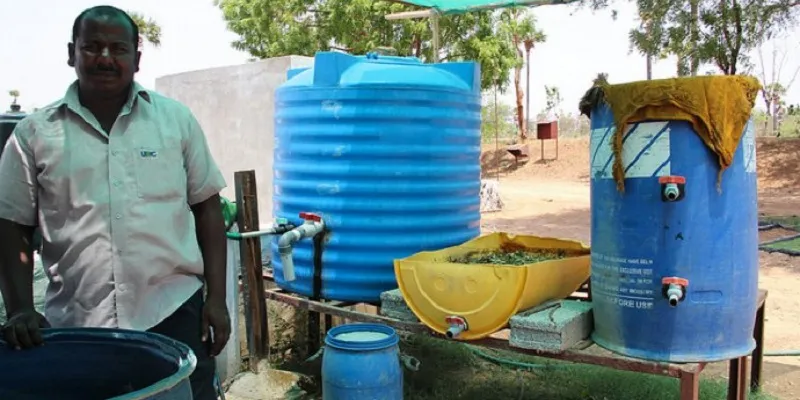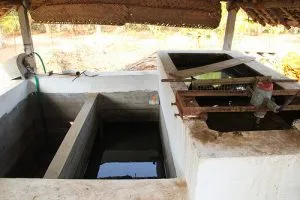This rural innovator is helping TN farmers set up their own organic manure factories for just Rs 800
Most farmers tend to have a basic knowledge of fertilisers, like nitrogen and phosphorus, which are essential for plant growth. They are also aware of the fact that cow dung contains nitrogen. Then why is it that many farmers look for costly solutions rather than use the abundant cow dung they have in their farms as manure? Fortunately, one farmer did think of this.

Four years ago, with a little documentation help from the MYRADA Krishi Vigyan Kendra in Gobichettipalayam, Erode district (Tamil Nadu), India’s farming fraternity recognised farmer G. R. Sakthivel’s efforts in successfully using cattle refuse to create liquid manure to feed his crops. This feat is by no means ordinary and did not happen overnight. A staunch advocate of the organic movement, Sakthivel had always wanted to utilise the resources around him efficiently and he wasn’t going to leave out cattle refuse, which was there aplenty in all farms.
After years of careful observation and planning, he came up with a plan to recycle cow dung and urine from his farm. He designed a four-compartment unit for this purpose. First, the floor of the cattle shed was sloped to direct the urine into a channel. This urine drained into a collection tank. The dung was then removed manually from the floor. The collected dung-urine mixture was allowed to settle and filter stage by stage inside a compartment. The process resulted in a nutrient-rich filtrate. He diluted this filtrate and used it to directly irrigate his sugarcane fields using drip lines. The dung residue was not wasted either. It was directed into the biogas producing facility, which converted the waste into methane gas to fuel the family kitchen.
Four-tank system to ferment and filter cow dung manure
Although four-tank system drew the attention of several farmers across the country, not many embraced it as it was expensive. The four-tank collection and settling masonry structure cost a minimum of Rs 40,000 including materials and labour. Farmers with small holdings couldn't justify this expense, as much as the end result seemed worthwhile.

Alagesan, a farmer in Myladi in Chennimalai, decided to experiment with Sakthivel’s model. He wanted to create a simpler and more cost-effective liquid manure plant so that more farmers could benefit from the readily available manure on their own farms.
He did away with the dung collection and settling tanks since that was the major expense. Instead, he came up with a single container manure factory. No cement structures, no labour charges, no building costs. All he used was a huge plastic barrel.
The cow dung and urine are dumped in it together and allowed to settle for 24 hours. For every kilo of cow dung, five litre of cow urine is added. A little jaggery is then added to this mixture for fermentation. At a fraction of the cost, the same liquid manure is ready! This entire set up costs just Rs 800–1,000.
The barrel set up has two advantages. The first and most obvious is the affordability. The second and equally important advantage is portability. Unlike the immovable masonry structure, the barrel can be moved according to the farmer’s requirement to any part of the field. Maintenance is much simpler as well as cleaning doesn’t take much time or effort.
Both these men are still working towards simplifying the process further so that these manure churners can be placed in as many farms as possible. While many farmers in and around Erode have set up these manure factories, it will still take some time before these portable manure factories become as common as a plough or a sickle.
Disclaimer : This article, authored by Seetha Gopalakrishnan, was first published in India Water Portal.







